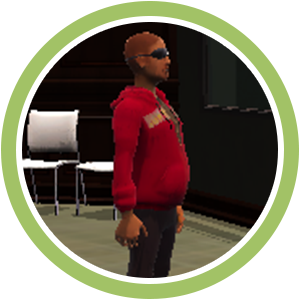
In the role of a graduate student, play through a real experiment that was designed to understand how blind people navigate through rooms. Answer questions and receive immediate feedback on terms used in experimental psychology.
About Blindman's Bluff
Learn terms in experimental psychology with a 1st person simulation where you take on the role of a student who wants to join a research lab. The game is appropriate for high school, college, or life-long learners.
You will answer a series of multiple-choice and open-ended in this engaging 20 minute-long experience.
An Impressometer gage displaying feedback has been created to show in real-time what the graduate students in the lab think of you as you progress through the game.
The simulation is a variation of a classic experiment conducted on how people who are blind navigate through new rooms (Supa, et al. 1944). This free version does not include data saving, please contact us for extra features.”
Learning Goals
Upon completion of this game, players will understand:
- Hypothesis generation
- Dependent and independent variables
- The refinement of a hypothesis
- Supporting or rejecting hypotheses based on data gathered
- How to alter just one variable
- Pattern seeking in the data
- As well as writing practice from the open-ended responses
Teacher Guide
Peer-Reviewed Research
Supa, M.; Cotzin, M.; & Dallenbach, K. M. (1944). Facial vision; the perception of obstacles by the blind. The American Journal of Psychology, Vol 57, 133-183. doi: 10.2307/1416946
Gameplay: 20 minutes
System Requirements
Compatible with all webGL enabled browsers. Click here for more information.
Licensing Information
This game is free to share and adapt in compliance with the non-commercial creative commons license guidelines.
To request open source files, contact us for more information.
Credits
Created by Mina C. Johnson-Glenberg, Marcella Gemelli, Bethany Van Vleet and Richard Fabes.
Made with support from the T. Denny Sanford School of Social and Family Dynamics and the Department of Psychology at Arizona State University.
